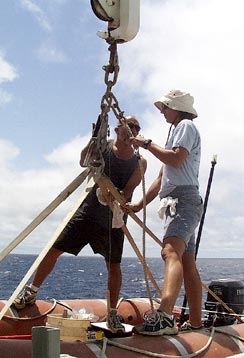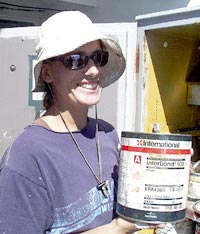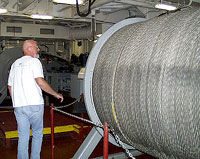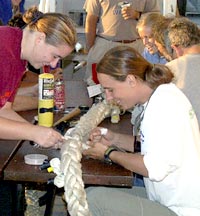Galápagos Islands
Expedition 5:
Aug 23-Sep 24, 2001
Mission & Objectives
Daily Updates
Mail Buoy
Scientists & Crew
Interviews
Hot Topics
Slideshows
Videos
Activities
Glossary
|
Interviews: Ordinary Seaman Lorna Allison
 Lorna helps Victor Barnhart, Bosun, to inspect the lifeboat. Lorna helps Victor Barnhart, Bosun, to inspect the lifeboat.
Tape? Check. Knife? Check. Thread and needle? Check, check.
A loop of the mooring line is hefted onto Revelle’s picnic
table. The braids show signs of stress, wear and tear. Tape is wrapped
around the middle of the loop where a clean cut results in two ends.
The operation quickly becomes a team project with scientists and crew
swapping stories. The seamen wrap one of the braids in the line with
red tape, another with yellow. Lorna Allison, Ordinary Seaman, is
getting a lesson in splicing.
Once the different braids of the line are identified with different
colors of tape, the braids from the two ends are interwoven together,
sections are overlapped and the frayed parts weeded out of the line.
When the splicing is finished, the loop of the line looks brand new.
“I’m learning how to splice lines, paint, operate a crane
and how to assist with the mooring lines when docking and leaving
port,” Lorna says.
 |
 |
| Lorna's job can be a messy one, here she selects paint for the crane. |
This
is her first trip at sea as a seaman and she is learning a lot. “I
have very few deck people and I need them to be proficient in all
aspects of seamanship,” says Lorna’s boss and Bosun, Vic Barnhart.
“Normally, the Bosun wouldn’t put an Ordinary Seaman up in a
crane, but I trust Lorna, she’s smart.”
From the cockpit, Lorna shifts the gears that raise the crane out
of its cradle. She lifts the boom up and at the same time lets out
the wire so the hook stays about three feet from the end of the boom.
From the deck, Vic signals each move. Once the boom is up he greases
the gears. Lorna then drives the crane in two circles each direction
to apply the grease evenly, slowly at first and then fast.
During the last fire and boat drill, Lorna suited up and filled in
for one of the seaman who was supposedly “down” after pretending
to inhale poisonous gas. “We muster in our designated areas,
mine is in the mess deck, to do a count and see who’s missing. The
fire team communicates with the bridge via radio. The principal investigator
checks out the situation with a portable air mask and tank, but he
doesn’t dress in a fire suit. If he sees smoke he’ll come back and
let the fire team know.”
 |
 |
| Learning
how all the machinery on board works is all part of being a
seaman. Lorna is learning to use all the cranes and winches
on board the Revelle. |
Lorna
went to sea as a mess attendant on the University of Washington’s
RV Thomas G. Thompson last year, after four years of teaching
sea kayaking and marine landscapes in Baja, Calif. She has always
been drawn to the outdoors. She grew up in Seattle with her parents
and older brother, Dan. During her time as an undergraduate, studying
art photography at the University of Washington, she would take time
off to travel on road trips to the southwest. “The deserts of
the southwest are totally different from Seattle - warm and dry instead
of wet and green,” Lorna says. She enjoyed her trips by herself
more than her art classes and when she learned about the adventure-education
courses at Prescott College in Arizona she moved south.
“I didn’t feel I was participating fully in life until I
went to Prescott,” Lorna says. The private college offered the
students a course in natural history, marine landscapes, navigation
and sea kayaking in Baja, Calif. When Lorna graduated she co-instructed
the course with her professor Robin Kelly. “We would paddle mostly
between Loreto and La Paz, and camp along the way. The only time we
were ever inside with air-conditioning was when we were grocery shopping.”
The trips would last for about a month and Lorna divided her time
between Baja, Seattle and Prescott, Az. She spent the fall and spring
seasons in Baja, either teaching students or leading tourist expeditions.
“By May the air would be well over 100 degrees Fahrenheit, but
the Sea of Cortez would still be cool and refreshing.”
 |
 |
|
Lorna and Kate Buckman help to finish the splice in a mooring line. |
 |
When
she tired of the sun, she moved back to Seattle where she knew she
wanted to sail. The Thomas G. Thompson didn’t need a seaman,
but they could use a mess attendant. Lorna washed dishes and filled
snack bins on board the Thompson for six months along the coast
of Washington, Oregon and California. In February she checked out
the Scripps research vessels and looked into joining the Revelle
on its expeditions to the Galápagos and Easter Island. “My
whole life, I’ve wanted to go to Easter Island,“ she says.
“The people of Polynesia have a history of incredible navigational
skills with no instruments, only the waves, the color of the sea,
the smell of the water and land around them and the position of the
stars.” After our current expedition ends, Lorna will cross the
equator again, as an experienced seaman or shellback, and sail with
Revelle to Peru and on to Easter Island.
|

 Lorna helps Victor Barnhart, Bosun, to inspect the lifeboat.
Lorna helps Victor Barnhart, Bosun, to inspect the lifeboat.

